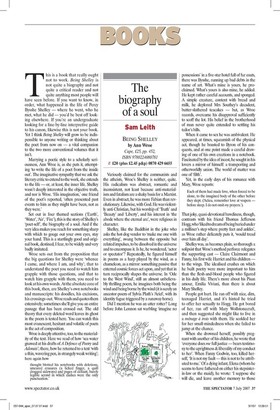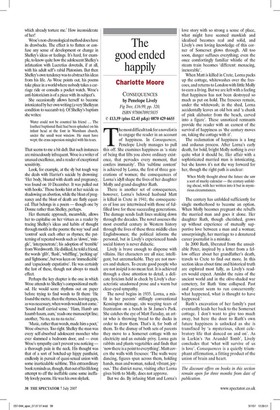The biography of a soul
Sam Leith BEING SHELLEY by Ann Wroe Cape, £25, pp. 452, ISBN 9780224080781 © £20 (plus £2.45 p&p) 0870 429 6655 This is a book that really ought not to work. Being Shelley is not quite a biography and not quite a critical reader and not quite anything most people will have seen before. If you want to know, in order, what happened in the life of Percy Bysshe Shelley — where he went, who he met, what he did — you'd be best off looking elsewhere. If you're an undergraduate looking for a line-by-line interpretive guide to his canon, likewise this is not your book. Yet I think Being Shelley will grow to be indispensible to anyone writing or thinking about the poet from now on — a vital companion to the two more conventional volumes that it isn't.
Marrying a poetic style to a scholarly seriousness, Ann Wroe is, as she puts it, attempting 'to write the life of a poet from the inside out'. The imaginative sympathy that we ask the literary critic to extend to the work, she extends to the life — or, at least, the inner life. Shelley wasn't deeply interested in the objective truth, and nor is Wroe. 'His imagination,' one friend of the poet's reported, 'often presented past events to him as they might have been, not as they were.'
Set out in four themed sections (Earth', 'Water', 'Air', 'Fire'), this is the story of Shelley's 'poet-self , the biography of a soul. And if the very idea makes you reach for something sharp with which to gouge out your own eyes, stay your hand. This is a startlingly good and original book, destined, I fear, to be widely and very badly imitated.
Wroe sets out from the proposition that the big questions for Shelley were 'whence I came, and where I am, and why'; that to understand the poet you need to watch him grapple with those questions, and that to watch him grapple with them, you need to look at his own words. At the absolute core of this book, then, are Shelley's own notebooks and manuscripts: his doodles, his excisions, his crossings-out. Wroe reads and quotes them extensively; sometimes she'll give you an entire passage that has been crossed out. The old theory that every deleted word leaves its ghost in the poem is tested here. You can watch this most evanescent, hesitant and volatile of poets in the act of composition.
Wroe is deeply attentive, too, to the materiality of the text. Here we read of how 'sea water gnawed at his drafts ofA Defence of Poen), and Adonais'; there, how he returned to a text 'with a thin, wavering pen, in strangely weak writing'; here again how thought blotted his notebooks with deletions, smeared erasures (a licked finger, a quill dragged sideways) and pages of defiant, barely legible scrawl in which dashes were the only punctuation.'
Variously claimed for the communists and the atheists, Wroe's Shelley is neither, quite. His radicalism was abstract, romantic and inconsistent, not least because anti-materialism and fatalism are a shaky basis for a Marxist. Even in abstract, he was more Fabian than revolutionary. Likewise, with God. He was violently anti-Christian, but his worship of 'Truth' and 'Beauty' and 'Liberty', and his interest in `the abode where the eternal are', were religious in character.
Shelley, like the Buddhist in the joke who asks the hot-dog vendor to 'make me one with everything', swung between the opposite but related impulses, to be dissolved in the universe and to encompass it. Is he, he wondered, 'actor or spectator'? Repeatedly, he figured himself in poems as a harp played by the wind, as a chameleon, as a mirror: something passive that external cosmic forces act upon, and yet that in turn reciprocally shapes the universe. In 'Ode to the West Wind', still an almost unbelievably thrilling poem, he imagines both being the wind and being borne by the wind (it is surely an ancestor-poem of Sylvia Plath's 'Ariel', with its identity fugue triggered by a runaway horse).
Did I mention he was an utter rotter? Long before John Lennon sat warbling 'imagine no possessions' in a five-star hotel full of fur coats, there was Bysshe, running up bad debts in the name of art. What's mine is yours, he proclaimed. What's yours is also mine, he added. He kept rather careful accounts, and sponged. A simple creature, content with bread and milk, he deplored Mrs Southey's decadent, butter-slathered teacakes — but, as Wroe records, overcame his disapproval sufficiently to scoff the lot. His belief in the brotherhood of man never quite extended to settling his tailor's bills.
When it came to sex he was ambivalent. He appeared, at times, squeamish of the physical act, though he boasted to Byron of his conquests, and at one point made a careful drawing of one of his own erections in a notebook. Fascinated by the idea of incest, he sought in his lovers a mirror of himself: a transporting and otherworldly union. The world of matter was one of 'filth'.
Yet, in the early days of his romance with Mary, Wroe reports: Each of them had made love, when forced to be alone, to the imagined body of the other before they slept. (Adieu, remember love at vespers — before sleep. I do not omit my prayers.').
That joky, quasi-devotional bawdiness, though, contrasts with his friend Thomas Jefferson Hogg, who 'liked to dream of beingburied under a milliner's step where pretty feet and ankles', as Wroe rather delicately puts it, 'would tread over him all day'.
Shelley was, as becomes plain, so thorough a solipsist that Wroe's method perforce relegates the supporting cast — Claire Clairmont and Fanny, his first wife Harriet and his children — to the wings. The idealised crushes on which he built poetry were more important to him than the flesh-and-blood people who figured in his daily life. There's more about his Pisan amour, Emilia Viviani, than there is about Mary Shelley.
People got hurt. He ran off with nice, dim, teenaged Harriet, and it's hinted he tried to offer her sexually to Hogg. He got bored of her, ran off with Mary Wollstonecraft, and then suggested she might like to live in a ménage a trois with them. He scolded her for her small-mindedness when she failed to jump at the chance.
When she drowned herself, possibly pregnant with another of his children, he wrote that 'everyone does me full justice — bears testimony to the uprightness & liberality of my conduct to her'. When Fanny Godwin, too, killed herself, 'It is not my fault — this is not to be attributed to me.' Of a dying infant, Elena (whom he seems to have fathered on either his stepsisterin-law or the maid), he wrote: 'I suppose she will die, and leave another memory to those which already torture me.' How inconsiderate of her!
Wroe's non-chronological method does have its drawbacks. The effect is to flatten or confuse any sense of development or change in Shelley's ideas or feelings. It's hard, for example, to know quite how the adolescent Shelley's infatuation with Lucretius dovetails, if at all, with his adult self's rabid Platonism. But then Shelley's own tendency was to abstract his ideas from his life. As Wroe points out, his poems take place in a world where nobody takes a carriage ride or consults a pocket watch. Wroe's anti-historicism is of a piece with its subject's.
She occasionally allows herself to become intoxicated by her own writing (a very Shelleyan condition to succumb to). Of Shelley's baptism she writes: Water could not be counted his friend ... The loathed baptismal fluid had been splashed on his infant head at the font in Warnham church, under the small west window. He must have wept; the crass aspersion mingled with his tears.
That seems to me a bit daft. But such instances are miraculously infrequent. Wroe is a writer of unusual excellence, and a reader of exceptional sensitivity.
Look, for example, at the sly but tough way she deals with Harriet's suicide by drowning: 'Her body, bloated with death and pregnancy, was found on 10 December. It was pulled out with hooks.' Those hooks hint at her suicide as shadowing an abortion, while the bloat of pregnancy and the bloat of death are flatly equated. That belongs in a poem — though one by Donne rather than Shelley, perhaps.
Her thematic approach, meanwhile, allows her to capitalise on her virtues as a reader by tracing Shelley's ideas and habits of thought through motifs in the poems: the way 'soul' and 'control' seek each other as rhymes; the patterning of repeated words such as 'down', 'mingle', 'interpenetrate'; his adoption of 'tremble' from Wordsworth. He disliked, he told a friend, the words 'glib', 'flush', 'whiffling', 'perking up' and lightsome', but was keen on 'immedicable' and 'capaciously expatiative'. He was certainly the last of these, though not always to much effect.
Perhaps the key chapter is the one in which Wroe attends to Shelley's compositional method. He would score rhythms out on paper before trying to find words to fit them: 'He found the metre, then the rhymes, leaving gaps, as was necessary, when words would not come.' 'Sound itself carried sense."Ham, Humb um haumb haum, aum,' reads one manuscript line; another, `Na na, na na na na/na'.
'Music, rather than words, made him a poet,' Wroe observes. Too right. Shelley the man was every self-absorbed adolescent moocher who ever slammed a bedroom door, and — even Wroe's sympathy can't prevent you noticing — a thorough pain in the neck. His thought was that of a sort of botched-up hippy pantheist, endlessly in pursuit of quasi-sexual union with some inarticulable sublime. This extraordinary book reminds us, though, that out of his lifelong attempt to eff the ineffable came some ineffably lovely poems. He was his own skylark.




















































 Previous page
Previous page